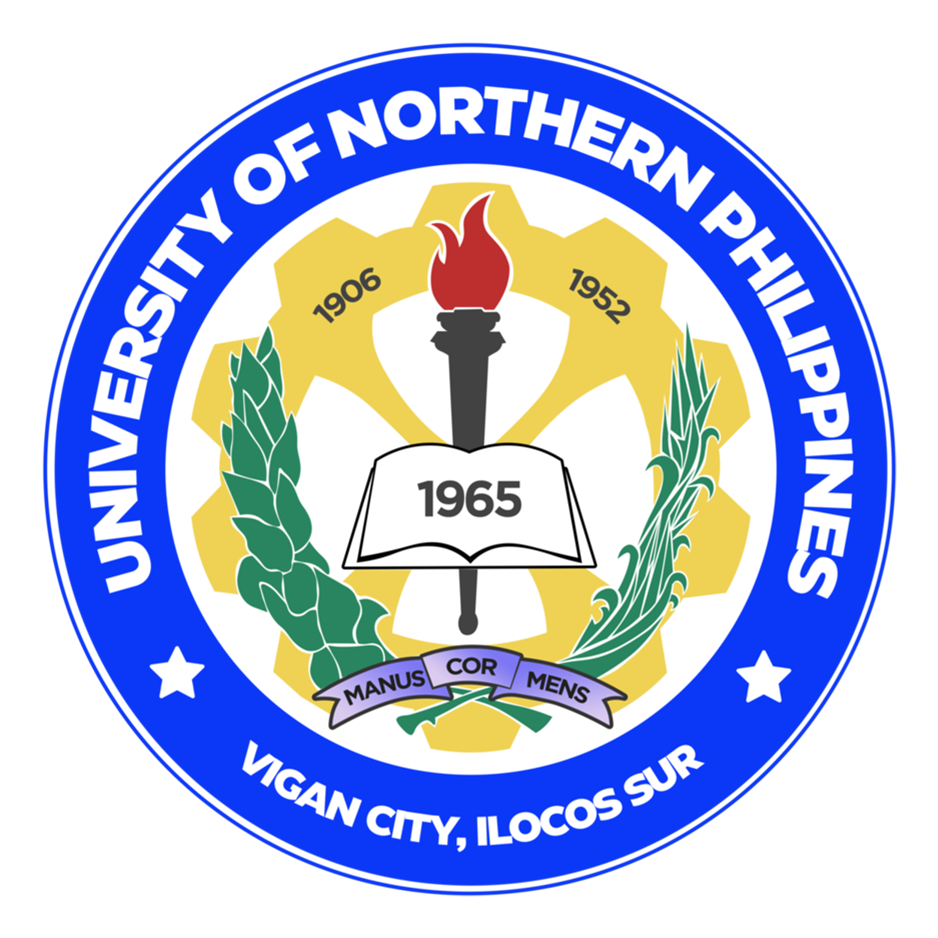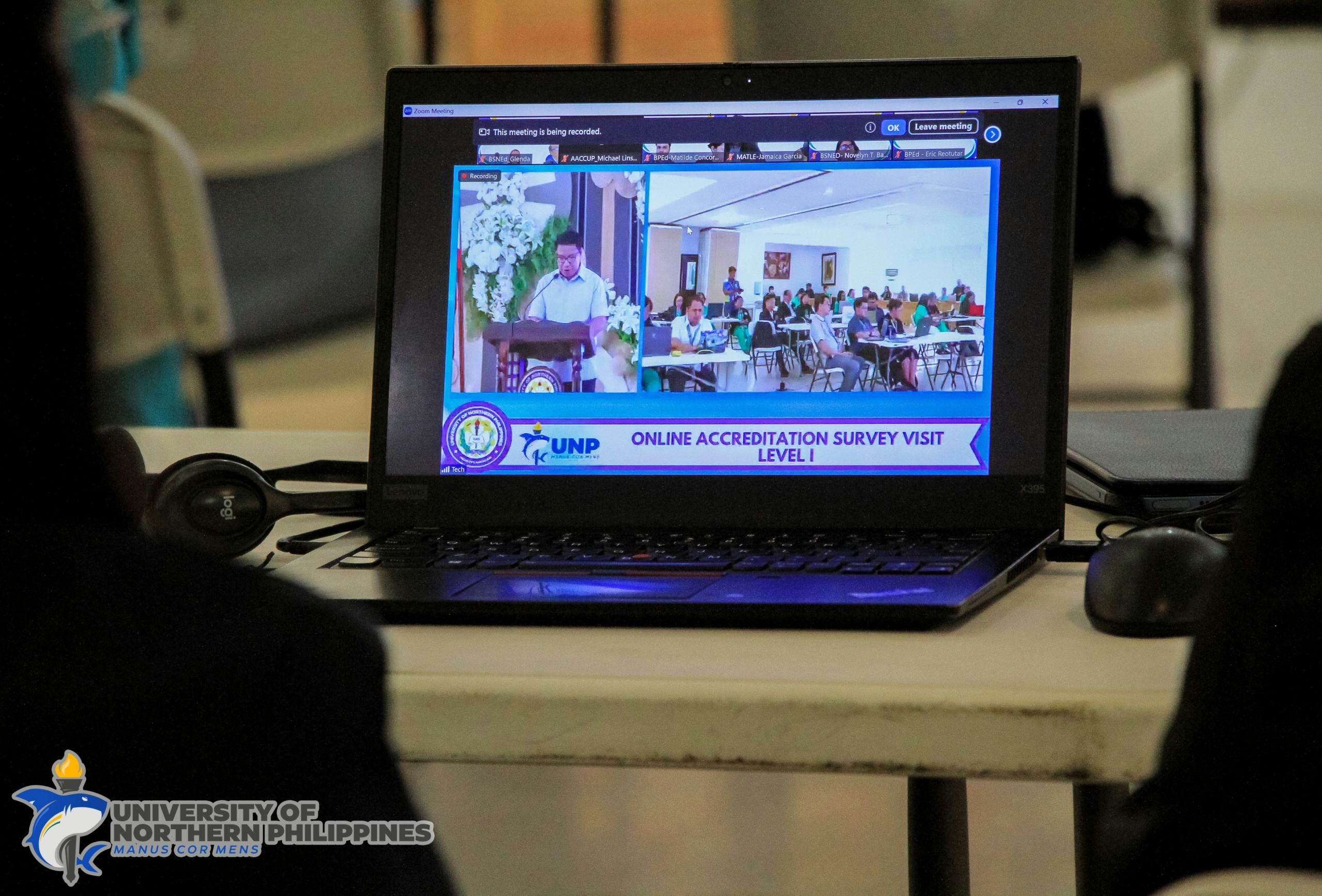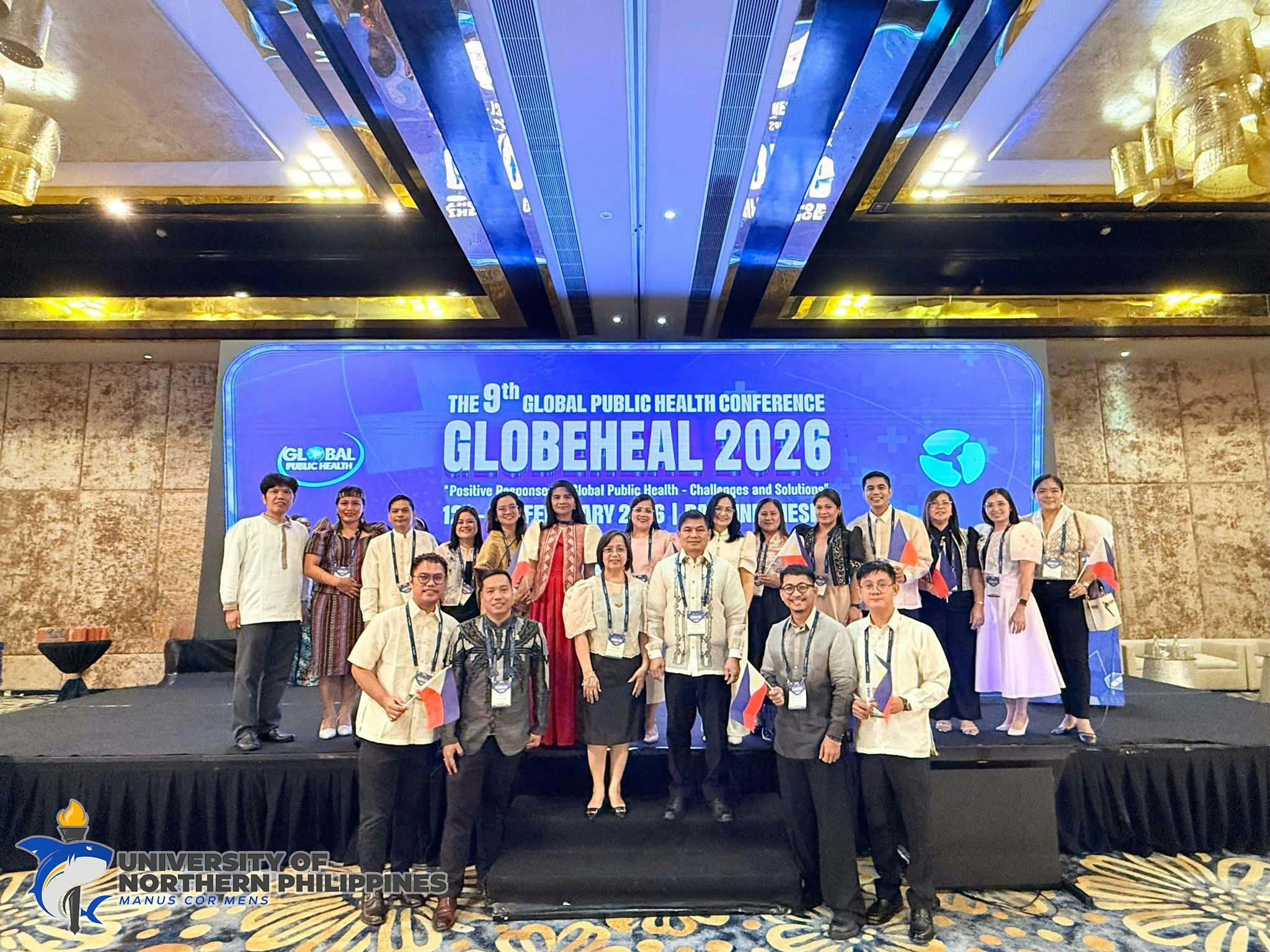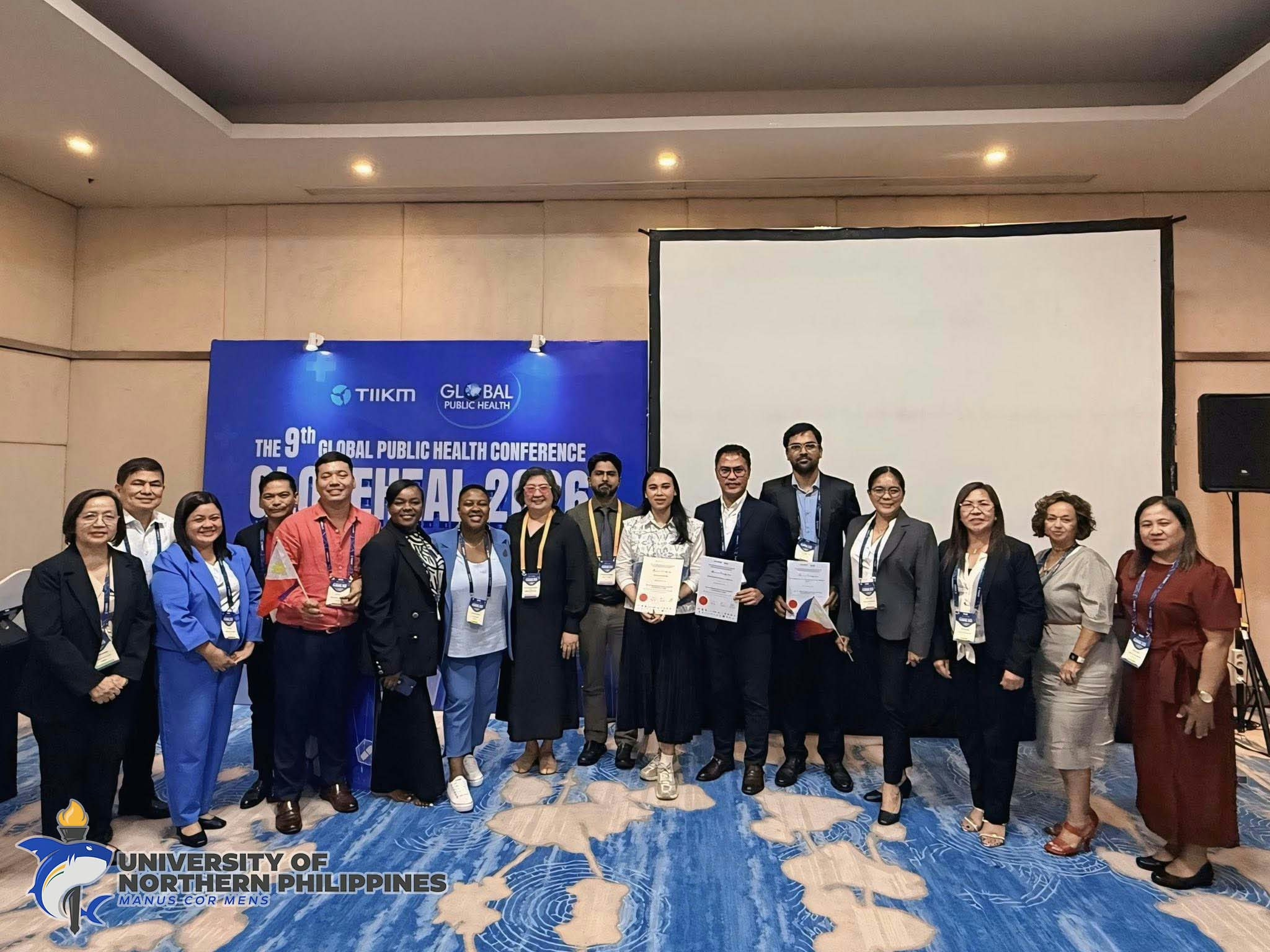The University of Northern Philippines (UNP) formally opened its Online Accreditation Survey Visit on September 22–26, 2025, at Tadena Hall, placing the spotlight on three academic programs of the College of Teacher Education (CTE).
The programs up for evaluation include the Bachelor of Physical Education (BPED), Bachelor of Special Needs Education (BSNED), and the Master of Arts in Technology and Livelihood Education major in Home Economics (MATLE-HE), all of which are undergoing Level I accreditation. The process is spearheaded by the Accrediting Agency of Chartered Colleges and Universities in the Philippines, Inc. (AACCUP, Inc.), the duly recognized body tasked with assessing and ensuring the quality of academic offerings in State Universities and Colleges (SUCs) nationwide.
During the opening program, Dr. Rolando Navarro, Vice President for Academic Affairs, underscored that accreditation should be viewed not merely as a compliance exercise but as a valuable opportunity for growth. He stressed that the survey visit serves as a moment for the university to reflect on its achievements, recognize areas for improvement, and reinforce its commitment to a culture of quality service. Dr. Navarro further highlighted that accreditation pushes institutions to move beyond requirements, inspiring innovation, ensuring program relevance, and reaffirming the university’s mission of delivering excellent and socially responsive education. His message set a collaborative and determined spirit that guided the five-day activity.
UNP President Dr. Erwin Cadorna was unable to personally grace the opening program as he is on official travel to Manila for equally important University-related commitments. Despite his absence, his support and guidance were acknowledged by the academic community, underscoring his continued leadership in advancing UNP’s mission of quality education and institutional development.
The survey visit follows a structured program of activities designed to ensure a systematic and comprehensive evaluation. The week-long engagement officially began on September 22 with the online review of documents. However, the on-site opening program and orientation, originally scheduled earlier in the week, were delayed to September 24 due to Typhoon Nando, which affected parts of Northern Luzon, including Ilocos Sur.
After the opening program at Tadena Hall, the succeeding days are dedicated to intensive review and validation. From September 25 to 26, the evaluators will carry out further online document checks, conduct interviews with institutional counterparts, and hold regular team meetings to consolidate findings. The activities also expand to include discussions with stakeholders, the drafting of reports, and additional team deliberations to refine their assessment.
The visit will culminate on September 26 with a formal closing program, highlighting key evaluation results and recognizing the contributions of both the accrediting team and the UNP community.
The AACCUP accrediting team is composed of esteemed evaluators from various state universities and colleges nationwide. For the MATLE-HE program, Dr. Sherrilyn B. Quintos of Bataan Peninsula State University serves as coordinator, with Dr. Romulo B. Mercado, Jr. of Bulacan State University as team leader and Dr. Sonia U. Arcilla of Partido State University as lead accreditor. For BSNED, the team is led by Dr. Zhania U. Custodio of Philippine Normal University, joined by Prof. Liezl May Galicia-Perez of Agusan del Sur State College of Agriculture and Technology, and Prof. Micheal V. Linsangan of Nueva Ecija University of Science and Technology. For BPED, Dr. Sherina D. Dimo of West Visayas State University serves as team leader. Their diverse expertise ensures a credible, fair, and comprehensive evaluation of the three programs.
Leading the preparations for the visit are the program heads: Mr. Christian Dem R. Haluber for BSNED, Dr. Jeanina B. Batin for MATLE-HE, and Dr. Matilde T. Concordia for BPED, under the guidance of Dr. Ma. Teresa Susan L. Manzano, Dean of the College of Teacher Education. Supporting these efforts, faculty counterparts across accreditation areas present compliance evidence, engage in panel interviews, and showcase innovations that underscore the University’s alignment with AACCUP standards.
For Area I – VMGO, the team is composed of Dr. Maria Theresa V. Forneas, Dr. Jenny Lou R. Taan, Dr. Jamaica V. Garcia, and Mr. Mark Louie Tabunan. For Area II – Faculty, contributors include Dr. Rozen C. Villa, Mr. Marnie P. Tabilin, Ms. Melody R. Marquez, and Ms. Rose Jane A. Comilan, with specialized support for BPED from Dr. Eric F. Reotutar, Dr. Juvie Lynne T. Almachar, Dr. Jake M. Quitasol, and Mr. Renz Vermil Q. Ayson; and for BSNED from Ms. Didith R. Ramos, Dr. Leilani R. Raquepo, Dr. Fely R. De Guzman, and Ms. Shiela R. Manlangit.
For Area III – Curriculum and Instruction, the MATLE-HE team is represented by Dr. Jeanina B. Batin, Dr. Restituto Llagas, Dr. Ma. Rochelle F. Cabrales, Mr. Randal M. Rabacal, and Ms. Roselyn F. Alan; for BPED, Dr. Matilde T. Concordia, Mr. Arthur V. Pascua, and Ms. Maureen Lou A. Aragoza; and for BSNED, Mr. Christian Dem R. Haluber, Dr. Wendelyn T. Talbo, and Dr. Clarita P. Pere. For Area IV – Support to Students, representatives include Dr. Novelyn T. Barcena, Dr. Rainalda T. Rambuyon, Dr. Anastacia B. Joven, and Dr. Nancy T. Ubilas.
The Research Area (Area V) is strengthened by the contributions of Dr. Glenda C. Rabanal, Dr. Jose P. Pichay, Dr. Corazon G. Pardo, Dr. Mercedita Q. Queddeng, Dr. Elmarie T. Rin, Mr. Christian S. Domondon, Mr. Jeffrey E. Galangco, and Dr. Anita A. Arlegui. For Area VI – Extension, members include Dr. Efren U. Galapon, Dr. Mark Angelo C. Reotutar, Dr. Joey-nell T. Marzan, Dr. Alma Josefina A. Bobita, and Ms. Jamelle Frances A. Realin.
In Area VII – Library, participants are Mrs. Marieglo C. Presto, Ms. Leah T. Pimienta, Ms. Lucila R. Corpuz, Ms. Pacita Paz F. Mariñas, Ms. Shiela Joy C. Moreno, and Ms. Maricon P. Urbano. For Area VIII – Physical Plant and Facilities, the team include Dr. Dave B. Fontejon, Dr. Santiago R. Reolalas, and Mr. Schubert R. Soliven. Area IX – Laboratories is represented by Dr. Jojit D. Aquino and Mr. Norman Vic F. Naval. Finally, Area X – Administration is handled by Dr. Eleuteria R. Pacpaco, Dr. Victoria R. Arce, Mr. Reynaldo N. Regucera, Ms. Maribel B. Yasay, Mr. Jayson B. Burlaza, and Ms. Nathalie R. Rafanan.
Dr. Ma. Teresa Susan L. Manzano, Dean of the College of Teacher Education, serves as the driving force behind these collective efforts. In her message, she expressed heartfelt gratitude to the accrediting team and the UNP community for their dedication, teamwork, and steadfast commitment to advancing academic excellence.
Beyond the technicalities of the survey visit, the process became a testament to UNP’s culture of cooperation and shared responsibility. The accreditation required extensive preparation—spanning weeks, even months—of consolidating documents, complying with evidence requirements, aligning with AACCUP standards, and coordinating schedules. This collective endeavor underscores not only the University’s organizational readiness but also the steadfast commitment of its administrators, faculty, staff, and students. The smooth presentation of accomplishments, innovative practices, and forward-looking strategies further reflects the institution’s unity and determination to sustain growth and excellence.
The event goes beyond being a mere evaluation; it is a milestone that celebrates UNP’s progress in academic quality, instructional innovation, research productivity, extension initiatives, and community engagement. Each accreditation area underscores how the University’s programs remain relevant and responsive whether through student-centered curricula, comprehensive academic support, or meaningful partnerships with communities. At the same time, the process creates a space for reflection, enabling the University to identify challenges and transform them into opportunities for advancement.
Ultimately, the online accreditation survey visit highlights UNP’s steadfast commitment to quality assurance and academic excellence. Far beyond meeting compliance requirements, the process affirms the University’s dedication to delivering accessible, relevant, and globally competitive education. As UNP pursues higher levels of accreditation, it remains resolute in advancing programs that are innovative, socially responsive, and attunes to the evolving needs of learners.
Accreditation plays a vital role in ensuring that the University’s academic programs remain aligned with both national and international standards in instruction, research, extension, and community service. It serves as a platform to validate institutional strengths, identify areas for improvement, and reaffirm to students, parents, and partner institutions that UNP delivers education that is relevant, excellent, and socially responsive. Beyond compliance, higher levels of accreditation also boost the University’s academic reputation, open doors to funding and development opportunities, and reinforce the global competitiveness of its graduates.
This endeavor reaffirms UNP’s vision of becoming a leading center of excellence in education, research, and community service in the region and beyond. By consistently raising the bar of quality, the university positions itself as a vital contributor to nation-building producing competent, ethical, and socially responsible graduates who are prepared to create meaningful change in their professions and communities.




